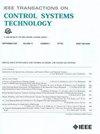Multilevel Control Strategy of Human–Exoskeleton Cooperative Motion With Multimodal Wearable Training Evaluation
IF 4.9
2区 计算机科学
Q1 AUTOMATION & CONTROL SYSTEMS
引用次数: 0
Abstract
A multilevel control strategy is proposed for a lower limb exoskeleton to realize different human training modes. In the high-level control layer, the human training mode is decided by the operator’s motion intention to generate the reference gait trajectory. Meanwhile, both the joint estimation torque by the long short-term memory (LSTM) network and the human-exoskeleton interactive torques are used to evaluate the wearable comfort performance of the operator. In the middle-level control layer, a variable admittance controller is designed to plan three training modes of human-exoskeleton cooperative motion: passive, active, and passive-to-active mode (PAM). In the low-level control loop, a fixed-time convergent controller with radial basis function neural network (RBFNN) estimation law and input deadzone compensation is presented to guarantee the exoskeleton joint position tracks the desired trajectory of the admittance loop output. To avoid the Zeno phenomenon of the designed controller, an event-triggered mechanism (ETM) is used to determine the execution time for sampling and transmitting signals. Finally, the effectiveness of the proposed control strategy is verified by both simulation and experimental results.基于多模态可穿戴训练评估的人-外骨骼协同运动多级控制策略
提出了一种下肢外骨骼多级控制策略,以实现不同的人体训练模式。在高级控制层,由操作者的运动意图决定人体训练模式,生成参考步态轨迹。同时,采用长短期记忆(LSTM)网络联合估计力矩和人-外骨骼交互力矩对操作者的穿戴舒适性进行评价。在中层控制层,设计了可变导纳控制器,规划了三种人体外骨骼协同运动训练模式:被动、主动和被动到主动模式(PAM)。在低阶控制回路中,采用径向基函数神经网络(RBFNN)估计律和输入死区补偿的定时收敛控制器,保证外骨骼关节位置跟踪导纳回路输出的期望轨迹。为避免所设计控制器的芝诺现象,采用事件触发机制(ETM)确定信号采样和传输的执行时间。最后,通过仿真和实验结果验证了所提控制策略的有效性。
本文章由计算机程序翻译,如有差异,请以英文原文为准。
求助全文
约1分钟内获得全文
求助全文
来源期刊

IEEE Transactions on Control Systems Technology
工程技术-工程:电子与电气
CiteScore
10.70
自引率
2.10%
发文量
218
审稿时长
6.7 months
期刊介绍:
The IEEE Transactions on Control Systems Technology publishes high quality technical papers on technological advances in control engineering. The word technology is from the Greek technologia. The modern meaning is a scientific method to achieve a practical purpose. Control Systems Technology includes all aspects of control engineering needed to implement practical control systems, from analysis and design, through simulation and hardware. A primary purpose of the IEEE Transactions on Control Systems Technology is to have an archival publication which will bridge the gap between theory and practice. Papers are published in the IEEE Transactions on Control System Technology which disclose significant new knowledge, exploratory developments, or practical applications in all aspects of technology needed to implement control systems, from analysis and design through simulation, and hardware.
 求助内容:
求助内容: 应助结果提醒方式:
应助结果提醒方式:


